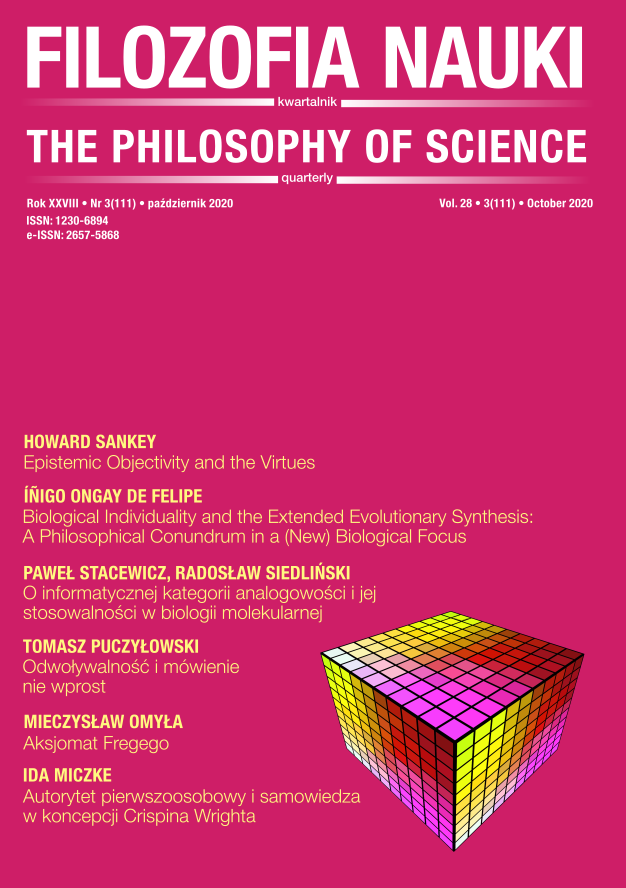Autorytet pierwszoosobowy i samowiedza w koncepcji Crispina Wrighta
DOI:
https://doi.org/10.14394/filnau.2020.0018Słowa kluczowe:
self-knowledge, first-person authority, Crispin Wright, constitutivism, epistemologyAbstrakt
The aim of this paper is to analyze Crispin Wright’s constitutivist account of self-knowledge and first-person authority. Wright offered an alternative to standard detectivist theories of selfknowledge and first-person authority. According to his proposal, the subject does not detect her mental states, but rather creates them. Wright offered his proposal as a result of considering the problem of rule-following. In the paper, I describe Wright’s solution and analyze its problems. I claim that these problems render his theory unconvincing, and I try to uncover the sources of his failure. First of all, I claim that Wright did not get rid of picturing self-knowledge as a kind of perception, and I suggest that some problems within his theory are the same as those within perceptual theories of self-knowledge. I then turn to problems with the interpretation according to which Wright presents first-person authority as a product of our mental discourse only. Finally, I present an outline of a solution to the problems of Wright’s theory in which I follow David Finkelstein’s neo-expressivist proposal. I argue that an expressivist solution can be obtained by considering Fred Dretske’s conciliatory skepticism and that investigating Dretske’s account enables one to understand why Wright’s question concerning the relationship between the subject and her mental states is ill-formulated.
Bibliografia
Bar-On D. (2004), Speaking My Mind: Expression and Self-Knowledge, Oxford: Clarendon Press. https://doi.org/10.1093/0199276285.001.0001
Bar-On D. (2009), First-Person Authority: Dualism, Constitutivism, and Neo-Expressivism, „Erkenntnis” 71(1), 53-71. https://doi.org/10.1007/s10670-009-9173-y
Bar-On D. (2012), Expression, Truth, and Reality: Some Variations on Themes from Wright [w:] Mind, Meaning, and Knowledge: Themes from the Philosophy of Crispin Wright, A. Coliva (ed.), Oxford: Oxford University Press, 162-192. https://doi.org/10.1093/acprof:oso/9780199278053.001.0001
Comte A. (2009), The Positive Philosophy of Auguste Comte (Cambridge Library Collection — Religion), vol. 1, tr. H. Martineau, Cambridge: Cambridge University Press. https://doi.org/10.1017/CBO9780511701450
Davidson D. (1987), Knowing One’s Own Mind, „Proceedings and Addresses of the American Philosophical Association” 60(3), 441-458. https://doi.org/10.2307/3131782
Dretske F. (2012), Awareness and Authority: Skeptical Doubts about Self-Knowledge [w:] Introspection and Consciousness, D. Smithies, D. Stoljar (eds.), Oxford: Oxford University Press, 49-64. https://doi.org/10.1093/acprof:oso/9780199744794.003.0002
Dziobkowski B. (2016), Teorie znaczenia [w:] Przewodnik po filozofii języka, J. Odrowąż-Sypniewska (red.), Kraków: Wydawnictwo WAM, 19-66.
Finkelstein D. H. (2003), Expression and the Inner, Cambridge, MA: Harvard University Press.
Gertler B. (2020), Self-Knowledge [w:] The Stanford Encyclopedia of Philosophy (Spring 2020 Edition), E. N. Zalta (ed.), https://stanford.io/34SJqJY.
Komorowska-Mach J. (2015), Przypisywanie sobie emocji — wyrażanie czy wykrywanie? Elementy detektywistyczne w modelu neoekspresywistycznym, „Filozofia Nauki” 23(4) [92], 41-54.
Kripke S. (2007), Wittgenstein o regułach i języku prywatnym, tłum. K. Posłajko, L. Wroński, Warszawa: Aletheia.
Moran R. (2001), Authority and Estrangement: An Essay on Self-Knowledge, Princeton, NJ: Princeton University Press. https://doi.org/10.1515/9781400842971
Ryle G. (2009), The Concept of Mind, London–New York: Routledge. https://doi.org/10.4324/9780203875858
Russell B. (1912), The Problems of Philosophy, London: Williams and Norgate.
Schwitzgebel, E. (2016), Introspection [w:] The Stanford Encyclopedia of Philosophy (Winter 2016 Edition), E. N. Zalta (ed.), https://stanford.io/31k5IDB.
Shoemaker S. (1994), Self-Knowledge and “Inner Sense”: Lecture I. The Object Perception Model, „Philosophy and Phenomenological Research” 54(2), 249-269. https://doi.org/10.2307/2108488
Smith B. C. (2012), The Publicity of Meaning and the Interiority of Mind [w:] Mind, Meaning, and Knowledge: Themes from the Philosophy of Crispin Wright, A. Coliva (ed.), Oxford: Oxford University Press, 127-161. https://doi.org/10.1093/acprof:oso/9780199278053.001.0001
Wittgenstein L. (2000), Dociekania filozoficzne, tłum. B. Wolniewicz, Warszawa: Wydawnictwo Naukowe PWN.
Wright C. (1998), Self-Knowledge: The Wittgensteinian Legacy [w:] Knowing Our Own Minds, C. Wright, B. C. Smith, C. Macdonald (eds.), Oxford: Oxford University Press, 13-45. https://doi.org/10.1093/0199241406.001.0001
Wright C. (2001a), Kripke’s Account of the Argument against Private Language [w:] Rails to Infinity: Essays on Themes from Wittgenstein’s Philosophical Investigations, Cambridge, MA: Harvard University Press, 91-115.
Wright C. (2001b), On Making Up One’s Mind: Wittgenstein on Intention [w]: Rails to Infinity: Essays on Themes from Wittgenstein’s Philosophical Investigations, Cambridge, MA: Harvard University Press, 116-142.
Wright C. (2001c), Wittgenstein’s Rule Following Considerations and the Central Project of Theoretical Linguistics [w:] Rails to Infinity: Essays on Themes from Wittgenstein’s Philosophical Investigations, Cambridge, MA: Harvard University Press, 170-213.



















 Filozofia Nauki | ISSN 1230-6894 | e-ISSN 2657-5868
Filozofia Nauki | ISSN 1230-6894 | e-ISSN 2657-5868